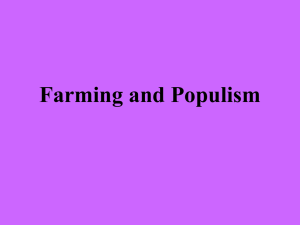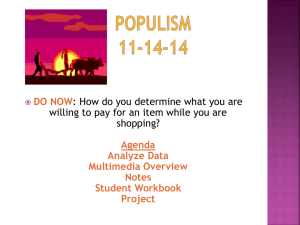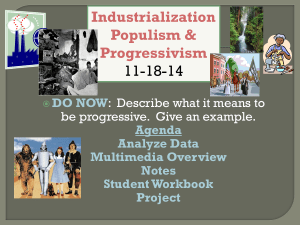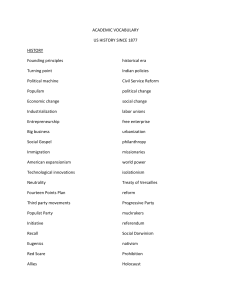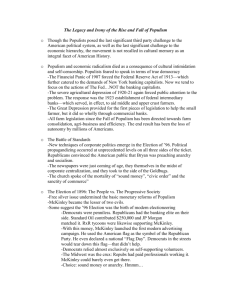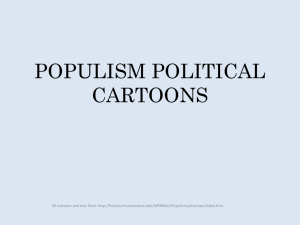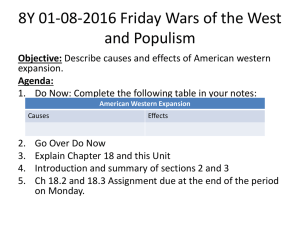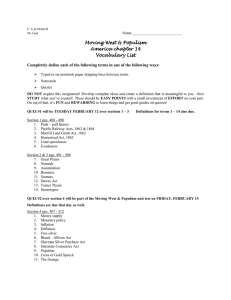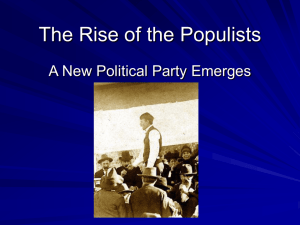Document 10464468
advertisement
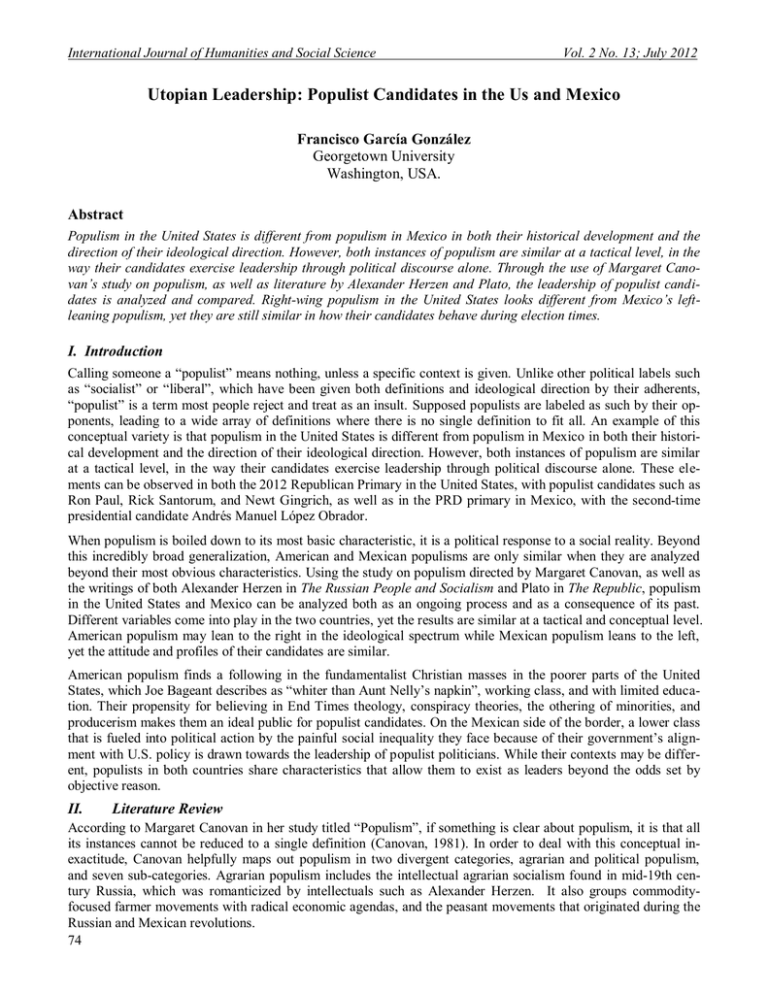
International Journal of Humanities and Social Science Vol. 2 No. 13; July 2012 Utopian Leadership: Populist Candidates in the Us and Mexico Francisco García González Georgetown University Washington, USA. Abstract Populism in the United States is different from populism in Mexico in both their historical development and the direction of their ideological direction. However, both instances of populism are similar at a tactical level, in the way their candidates exercise leadership through political discourse alone. Through the use of Margaret Canovan’s study on populism, as well as literature by Alexander Herzen and Plato, the leadership of populist candidates is analyzed and compared. Right-wing populism in the United States looks different from Mexico’s leftleaning populism, yet they are still similar in how their candidates behave during election times. I. Introduction Calling someone a “populist” means nothing, unless a specific context is given. Unlike other political labels such as “socialist” or “liberal”, which have been given both definitions and ideological direction by their adherents, “populist” is a term most people reject and treat as an insult. Supposed populists are labeled as such by their opponents, leading to a wide array of definitions where there is no single definition to fit all. An example of this conceptual variety is that populism in the United States is different from populism in Mexico in both their historical development and the direction of their ideological direction. However, both instances of populism are similar at a tactical level, in the way their candidates exercise leadership through political discourse alone. These elements can be observed in both the 2012 Republican Primary in the United States, with populist candidates such as Ron Paul, Rick Santorum, and Newt Gingrich, as well as in the PRD primary in Mexico, with the second-time presidential candidate Andrés Manuel López Obrador. When populism is boiled down to its most basic characteristic, it is a political response to a social reality. Beyond this incredibly broad generalization, American and Mexican populisms are only similar when they are analyzed beyond their most obvious characteristics. Using the study on populism directed by Margaret Canovan, as well as the writings of both Alexander Herzen in The Russian People and Socialism and Plato in The Republic, populism in the United States and Mexico can be analyzed both as an ongoing process and as a consequence of its past. Different variables come into play in the two countries, yet the results are similar at a tactical and conceptual level. American populism may lean to the right in the ideological spectrum while Mexican populism leans to the left, yet the attitude and profiles of their candidates are similar. American populism finds a following in the fundamentalist Christian masses in the poorer parts of the United States, which Joe Bageant describes as “whiter than Aunt Nelly’s napkin”, working class, and with limited education. Their propensity for believing in End Times theology, conspiracy theories, the othering of minorities, and producerism makes them an ideal public for populist candidates. On the Mexican side of the border, a lower class that is fueled into political action by the painful social inequality they face because of their government’s alignment with U.S. policy is drawn towards the leadership of populist politicians. While their contexts may be different, populists in both countries share characteristics that allow them to exist as leaders beyond the odds set by objective reason. II. Literature Review According to Margaret Canovan in her study titled “Populism”, if something is clear about populism, it is that all its instances cannot be reduced to a single definition (Canovan, 1981). In order to deal with this conceptual inexactitude, Canovan helpfully maps out populism in two divergent categories, agrarian and political populism, and seven sub-categories. Agrarian populism includes the intellectual agrarian socialism found in mid-19th century Russia, which was romanticized by intellectuals such as Alexander Herzen. It also groups commodityfocused farmer movements with radical economic agendas, and the peasant movements that originated during the Russian and Mexican revolutions. 74 © Centre for Promoting Ideas, USA www.ijhssnet.com Political populism, according to Canovan, has its origin in the 20th century with the populist dictatorships seen in Latin America, such as that of Getúlio Vargas in Brazil and Juan Perón in Argentina. Reactionary populism, such as the segregationist backlash that happened in the United States after the Civil War and the African-American Civil Rights Movement. The more modern categories include the concept of populist democracy, as well as “politician’s populism.” A populist democracy strives for more “participation” by seeking reforms that lead, for example, to a wider use of referendums such as in the state of California (The Economist, 2011). “Politician’s populism” is characterized by broad and ambiguous calls to “the people” in mostly non-ideological political rhetoric (Canovan, 1981). The earliest of these examples goes back to mid-19th century Russia, when Alexander Herzen published his 1856 book The Russian People and Socialism. It started as an open letter to French historian Jules Michelet on the subject of his hard opinions of Russia at a time when, in Herzen’s opinion, Russia was more relevant to the future of Europe than any country in Western Europe. However, it quickly turned into both an attack on the current regime in Russia from the point of view of “the people” and an optimistic view of the future of the Russian Empire as a superpower. All the concepts present in modern-day populism can be found in Herzen’s work: a generally bad opinion on the lack of perspective of his country’s current leaders, a rhetoric centered around the rebirth of society under a better leadership, a fear of other countries, an exceptionalist view of Russia’s future1, as well as a veiled defense of Argumentum ad populum2 politics. According to Herzen, the experience of “the people” was more relevant to the future of Russia simply because “the people” outnumbered the elite in power at the time. Many of Herzen’s points of view resound eerily in today’s populist rhetoric. The unifying thread of the book is the idea that “the Russian question is assuming grave, and disturbing proportions” while “people of all parties feel concern about it.” Herzen emphasizes this urgency by othering countries it considers to be backwards 3. Comparisons are pointed out between Russia’s relationship with Europe and the Roman Empire’s relationship with the barbarians, with the exception that “no one has dared oppose [Russia’s] claims to interfere in the affairs of Europe” (Herzen, 1979). Herzen’s political opinions refer to Russia’s need for a new leader who will take it into the future successfully, know how to handle the wealth of the country without benefiting some and oppressing others, and go in the direction of gradually perfecting Russia through the actions of a better government. For his time, when monarchy was still the most widely accepted form of government and Russia saw itself as relatively safe from the threats presented by French and American revolutions, Herzen’s views on leadership and the role of “the people” in governance were innovative. Suggesting that the elite in a monarchy should seek the approval of “the people” was unheard of. However, analyzing populism as a whole can only be done by going back to the classical works that shaped political thought in Herzen’s time and in modern days. Plato’s Republic is a basic source to analyze the characteristics of what both Herzen and modern populists consider “good” leadership and governance. Plato’s unusual take on justice through the ethics of duty versus interest, his focus on the ethics of leadership, and the difference between good and bad governing proves The Republic’s relevance to modern day politics. It is important to clarify that in much the same way that Plato’s city-state of Kallipolis is a utopia, populist candidates talk about their proposals for leadership as an ideal plan on the road towards perfection. Since neither Socrates in The Republic nor populist candidates actually hold positions of power, they only exercise their leadership through proposals of what they consider to be best for their society. The most basic analysis of The Republic stems from three basic assumptions: that a virtue is a quality that enables something to function well, that societies can be judged in the same way as individuals, and that people are born with different abilities for different occupations. A virtue is considered by Plato to be an essential part of a good thing (Santas, 2010). That is, a thing or a person is only virtuous as long as it works properly. Plato’s take on the judgment of both individuals and societies as equals, since he understands societies as groupings of individuals, means that political ethics4 are as important as normative ethics 5 (Plato, 1992, p. 368e). 1 “This empire, totally unknown two centuries ago, has suddenly burst in upon the world, as if by sheer force, and with no invitation, with no real right, has taken its place at the council table of the sovereigns of Europe, and has peremptorily demanded its share of the booty, although this was won without its assistance” (Herzen, 1979). 2 Argumentum ad populum fallacy: “If many believe so, it is true.” 3 Specifically “the most backwards of societies” such as China and Persia, but also comparing Russia to “less successful states” such as Austria. 4 Ethics for governments. 75 International Journal of Humanities and Social Science Vol. 2 No. 13; July 2012 Finally, Plato’s opinion on people’s abilities echoes in more modern takes such as John Rawls’ lottery of birth. In The Republic, this lottery gives credit to the specialized education and division of labor that takes place within the society of Kallipolis (Plato, 1992, pp. 369-370). Another basic analysis that is commonly identified with The Republic is that of Plato’s Tripartite Theory of the Soul with its three parts: reason, spirit, and appetite. 6 The appetitive soul is the one that deals with the most basic cravings of the human body, such as hunger and thirst. The spirited soul is the part of the soul that would be identified with a person’s character, which seeks the honor stemming from victory. The rational soul is what would be identified with a person’s mind and intellect. Taking the previous assumptions into account, the three souls can only lead to virtue if they are used to their maximum potential. According to Plato, this can only be done by providing people with the education that fits their dominant soul the best and giving them the occupation they would perform their best at. Plato argues that the rational soul should always rule the appetitive one with the aid of the spirited soul. Reason, with the help of the spirited soul, should protect the appetitive soul from its enemies; with the rational soul doing the planning, the spirit doing the fighting, and the appetitive soul aiding their survival. The concept of moderation comes into play as Socrates argues in Book IV that both the spirited and appetitive souls should moderate their instincts, as they have no real reason to oppose what the rational soul considers to be the best option. When applied to a society where each soul represents a different social class, it is implied that people cannot be completely free to choose what they want to do with their lives. True division of labor as defined in The Republic puts the more rational people, namely philosophers, in a position of leadership specifically because they are better suited for it. Tradition seems to favor giving authority to the strongest or richest leader, not the smartest. Nonetheless, Plato goes as far as flat out rejecting other suggested kinds of government such as timocracy7, oligarchy8, democracy9, and tyranny10 in favor of philosopher-kings. Political and military power, identified with the rational and spirited souls respectively, should be separated from wealth and property, which are identified with the appetitive soul. That is, philosopher-kings, as well as soldiers, should be rich enough to not have to worry about their own subsistence, but poor enough that they do not become an oppressive elite. These considerations lead to a definition of leadership which echoes that of modern day populist leaders. They sell themselves as individuals who are part of their society through some kind of “common” origin, but whose steadfast ideological convictions somehow make them virtuous and qualify them for leadership. Another important concept is that of justice as being the overarching theme behind the problem of duty and interest. When it comes to identifying duty as one’s moral obligations and interest as what is good for a person’s own good, other philosophers 11 see them as conflicting options regarding each individual action. Plato sees duty as a matter of justice, which he identifies with the person’s soul and not with the action they are about to perform. Therefore, if a person is just, their interest and their duty should not conflict. Nonetheless, when applying this analysis to a whole society, Plato fails to consider the attitude of the citizens toward their city and the motives they would have to cooperate with its maintenance. His ideal of unity and unanimity, while extremely optimistic, neglects its citizens’ happiness (White, 1979). Populist leaders will often commit the same mistake by not considering the position of non-adherents or opponents in their proposals. Finally, the part of Plato’s Theory of the Forms that concerns this analysis is mostly about how the more right an idea is, the more perfect it is and the least changes it will admit. Adding to the perfection of one’s ideas, it is implied by Plato that someone with perfect ideas is therefore more virtuous. 5 Ethics for individuals. Also known as Plato’s Tripartite Theory of the Soul. 7 Second best city after Kallipolis; ruled by whoever is better able to defend the city from outside enemies; “leaders are dominated by the spirited soul” (Grube 213). 8 Third best; ruled by the wealthiest portion of its society; “leaders are dominated by the appetitive soul” (Grube 213). 9 Fourth best; ruled by the consent of the governed; “leaders are dominated by unnecessary appetites” (Grube 213). That is, they are more concerned with agreeing with each other than with being just. 10 Worst city of all; ruled by a single person who is dominated by “lawless and unnecessary appetites” (Grube 213). 11 For example, Immanuel Kant. 6 76 © Centre for Promoting Ideas, USA www.ijhssnet.com The prisoners in Plato’s cave are all allowed to have different opinions of the shapes they are seeing, for what they are seeing is not the truth expressed as reality. In contrast, when one of them is able to leave the cave and face the truth of the outside world, his views are intrinsically more right and more perfect, making him more virtuous. Populist leaders are unlikely to compromise or negotiate, as they see their ideas as being closer to perfection than those of their opponents. III. Populism in the United States and in Mexico When analyzing populism in the United States and Mexico, a striking difference is their opposite location in the left-right political spectrum. Nevertheless, there are important differences between the two movements which must be analyzed before analyzing its leaders. Populism is in itself a political response to a social reality. This response, depending on its context, is personalized into different subjects in Mexico and the United States. American populism generally lacks specific leaders 12 and is personalized around groups of people, usually culturally perceived minorities. It also includes a perpetual sense of crisis where even if the actual crisis changes, “the populist response [is] remarkably consistent” (Taggart, 2000). Mexican populism, on the other hand, is more similar to other Latin American populisms 13 in that it is “personalized around individuals” (Taggart, 2000). While it may not be as headless as its American counterpart nor as perpetuated as its South American counterparts, it is characterized by a “mobilized but not yet autonomously organized popular sector” that is usually led and funded by an elite and kept together by a charismatic leader that acts as the “personalized link between leader and led” (Di Tella, 1997). Four characteristics are prevalent in American right-wing populism: producerism, “othering”, conspiracism, and apocalyptic narratives. Producerism is the “doctrine that champions the so-called producers in a society” while setting them against those it considers to be “unproductive elites and subordinate groups”, usually labeling them as lazy and immoral (Berlet & Lyons, 2000). An example is the agrarian populism of the U.S. People’s Party of 1891. With a supporter base composed of farmers and a notorious hostility towards elites, its aim was to restore the government to “the people” (Kuzminski, 2008). Othering is expressed as a process going from the marginalization, objectification, and demonization of a specific group of people to their use as scapegoats in the greater political scenario. This was done to black people by the Ku Klux Klan as a backlash to the Civil War, to communists by campaigns such as that of Senator Joseph McCarthy in the 1950’s, to Jews14 and Mexicans15 during World War I, as well as to every possible ethnic minority before the New Deal. Conspiracism comes up later as a narrative form of scapegoating that frames the enemy as part of a vast insidious plot against the “normal” workings of society while praising the scapegoater as a hero for “sounding the alarm” (Berlet & Lyons, 2000). It is often used to mask various forms of bigotry. Examples are diverse, with anti-Semitic attacks on the Federal Reserve’s “Jewish bankers”, racial stereotypes such as the “Welfare Queen”, anti-feminist organizations such as Phyllis Schlafly’s Eagle Forum16, and the more recent accusations that Muslims have infiltrated American politics all the way to President Obama himself. Apocalyptic narratives appear in American populist discourse as the anticipation of a righteous struggle against evil conspiracies. This leads to a “paranoid style” of politics, which is almost palpable in the way current American populists such as the Tea Party Movement treat minorities. For example, a University of Washington poll found that in the Seattle area, 88% of Tea Party voters agreed with the Arizona Senate Bill 107017, and 52% thought that proportionally to their size as a group, “gays and lesbians [have] too much political power” (Garber, 2010). The same paranoia can be seen in the ideas expressed by most of the candidates in the 2012 Republican Primary. 12 For example, the Tea Party and Occupy movements. For example, the Argentinean and Brazilian dictatorships mentioned before. 14 Consequence of right-wing American politicians’ sympathy toward Nazi Germany and other White Supremacy ideologies. 15 Consequence of both the Mexican Revolution, which happened at the same time as World War I, and the Zimmerman 13 Telegram, a diplomatic setup that implied a possible alliance between Mexico and the Central Powers against the United States. 16 “Leading Pro-Family Movement since 1972”. From their mission statement: “We oppose the feminist goals of stereotyping men as a constant danger to women, while at the same time pushing women into military combat against foreign enemies” (Eagle Forum). 17 Law which makes it a state crime for non-American citizens to be in the state illegally (Nowicki, 2010). It requires foreigners to have their immigration documents with them at all times, and expects law enforcement officers to determine a person’s immigration status based on “reasonable suspicion” that they may be an illegal immigrant. 77 International Journal of Humanities and Social Science Vol. 2 No. 13; July 2012 While Rick Santorum’s Christian Right 18, Newt Gingrich’s Hard Right 19, and Ron Paul’s Far Right 20 all represent different kinds of right-wing discourse, they share a reliance on apocalyptic narratives, producerism, othering, and conspiracism to increase their support among mostly conservative voters. These characteristics are not present in presumptive winner Mitt Romney’s campaign, which has a more moderate stance and little mass appeal. On the other side of the Río Bravo, Mexican populism has four main characteristics: its use of social inequality as an ideological tool, an opposition to U.S. policy as a very specific form of conspiracism, a conflicted relationship with media exposure, and rebirth narratives. Social inequality in Latin America, and specifically in Mexico, makes the masses look at populism as a stage in the development of their society (Sala de Tourón, 1983). Official narratives set the Mexican Revolution21 as a stepping stone into greater development for Mexican society, turning it into an ideological tool for a plethora of types of revolutionary populism. Examples include President Francisco I. Madero’s democratic populism throughout his 1910 presidential campaign, President Venustiano Carranza’s authoritarian populism through his Constitucionalista movement, the charismatic populism of President Álvaro Obregón through his image as a macho winner of the Revolution, and the authoritarian populism of President Plutarco Elías Calles in the early 20th Century (Basurto, 1982). President Calles was the first in a long list of Mexican politicians who saw democracy as “a hollow promise,” even as he attempted to use both its structures and the revolutionary myth to perpetuate his power (Buchenau, 2010). By a mixture of both military prestige and political maneuvering, he managed to perpetuate himself well beyond the four years of his administration in a period that would later be called El Maximato. By using the Revolution and its ideological appeal among the poor, he manipulated four of his successors into doing his bidding, becoming known as The Maximum Chief of the Revolution. A later use of populism as an ideological tool was President Luis Echeverría’s administration in 1970, which sought a mobilization of unions, the peasantry, and the middle classes under the umbrella of the Institutional Revolutionary Party22 (Basurto, 1982). The PRI is still seen by many as the materialization of the Mexican Revolution, and its principles continue to dominate conservative Mexican political discourse. U.S.-Mexico relations are a sensitive issue for any Mexican politician, yet it is populists who are usually sure about their feelings on them: they see anything related to the United States as negative. An excellent example is President Lázaro Cárdenas’ expropriation of Mexican oil in 1938, as well as his policy of land distribution, both of which show his fear of American influence in Mexico’s government and economy. Even smaller foreign policy issues, such as President Cárdenas’ support for the Spanish Republic and the protection given by his administration to Leo Trotsky in 1939, show a direct opposition to American interests. Years later, after the economic crises of the 1970’s and 1980’s led to Mexico’s adherence to the Washington Consensus and renewed trade negotiations with the United States, populists would take a stronger swing to the left by calling these developments the “treason of the right”. That is, they saw the actions of President Carlos Salinas de Gortari as a betrayal of the PRI’s left-leaning doctrine by bowing to U.S. pressure. It was in this context that Cuauhtémoc Cárdenas, President Cárdenas’ son, founded the Party of the Democratic Revolution23 in 1989 and ran for president for the first time. Although the PRI finally lost the presidency in 2000 and the PRD’s candidates are yet to win, its opposition to U.S. policy has not wavered. As recently as 2012, the PRD continues to espouse proposals related to the defense of the Mexican economy, particularly Mexican oil, from foreign interests 24. The PRD primary that led to candidate Andrés Manuel López Obrador’s 2012 campaign embodies the characteristics of a rebirth narrative and a conflicted relationship with the media. When he first ran for president in 2006, his image lost most of its mainstream legitimacy after being the object of an opposition-funded media campaign based around unfavorable comparisons to Venezuela’s Hugo Chavez (Hernández, 2006). 18 “Motivated by religious interpretations of cultural, social, and economic issues” (Berlet & Lyons, 2000). “Inflexible approach to politics, rejection of pluralist discourse in principle or in practice” (Berlet & Lyons, 2000). 20 “Squarely rejects the existing political system in favor of some form of authoritarianism” (Berlet & Lyons, 2000). In Ron Paul’s case, he rejects the existing system in favor of libertarianism. 21 Started in 1910, arguably ended between 1921 and 1935. 22 Partido Revolucionario Institucional, also known as PRI. 23 Partido de la Revolución Democrática, also known as PRD. 24 This is the topic of Andrés Manuel López Obrador’s book “La gran tentación: El petróleo de México.” The title translates as “The Great Temptation: Mexico’s Oil.” 19 78 © Centre for Promoting Ideas, USA www.ijhssnet.com At the time, he also committed many political mistakes of his own. He did not realize that the Mexican middle class, who did not necessarily identify with the peasant-centric rhetoric, was more influential in the election than the lower class masses he was focusing on (De La Calle & Rubio, 2012). After losing by an extremely narrow margin of 0.58%25 of the general vote to PAN26 candidate Felipe Calderón, this tactical mistake shaped the redirection of his next campaign. The PRD primary in 2011 saw López Obrador stating his political platform around a movement he called Movement for National Regeneration27, abbreviated in Spanish as “Morena”. Instead of being a political initiative, it is a civil association that claims to work toward the rebirth of Mexico as a “Republic of Love” 28. López Obrador’s rhetoric through “Morena” emphasizes his wish to regenerate, or rebirth, Mexican society through a greater political participation from the citizenry, especially the poorest ones. With an extensive media campaign through “Morena”’s music video29 and greater exposure to López Obrador’s “one of us,” the 2006 demonization of his image was carefully counteracted. Even though his opponent in the PRD primary, current Mayor of Mexico City Marcelo Ebrard, did not have to deal with these obstacles, his more moderate proposals lacked mass appeal outside the Mexico City area. Ebrard did not explicitly oppose U.S. policy, did not use social inequality as an ideological tool, was not extensively demonized or supported by the media, nor did he use rebirth rhetoric. IV. Classifying Populism in the United States and Mexico Analyzing populism in the United States through Margaret Canovan’s work shows that it combines interlocking waves of a farmer’s movement started in the late 19th century and modern reactionary populism. At the same time, there are isolated instances of politician’s populism that do not alter the course of the development of populism in the United States. The farmer’s movement that started with the U.S. People’s Party, members of which actually called themselves “populists”, was characterized by its members’ radical economic agendas concerning farming and land rights. Their proposals for ideological unification were based on agriculture as a common struggle for the farmers of the north and the south, while giving them hero status against exploitative “plutocrats”, such as bankers, land owners, and the corporate elite. However, they soon turned into an umbrella party that simply appealed to “the people” in order to not disappear. In Margaret Canovan’s words, it was “a call for the realignment of parties along class lines” that took advantage of populist rhetoric, such as the ambiguity of the concept of “the people” (Canovan, 1981). Later on, other instances of politician’s populism in the United States included President Jimmy Carter’s presidential campaign in 1976 and Ross Perot’s in 1994. They both banked on their catch-all appeal as outsiders to “the Washington establishment” while taking on producerist overtones in their rhetoric (Canovan, 1981). American politics are in a peculiar position as it concerns populism. Although the U.S. is the most “stridently populistic of nations”, it is also the most dedicated to progress and change (Canovan, 1981). This causes its “politician’s populism” to not resound as much as the reactionary populism that is so common nowadays. While “politician’s populism” appeals to “the people” in a non-ideological framework, reactionary populism appeals specifically to “the common man” with ideology as its backup. This notion of “the common man” is understood as the man that makes the “normal” workings of society possible; a common consequence being the exclusion and othering of any “abnormal” minorities through bigotry. The 2012 Republican primary is a hotbed for this kind of rhetoric. Rick Santorum famously equated homosexuality to bigamy, polygamy, incest, and adultery in a single interview30, all in an obvious attempt to win over the conservative Christian vote. 25 (Instituto Federal Electoral, 2006) National Action Party, or Partido Acción Nacional. 27 Movimiento de Regeneración Nacional 28 “Our purpose is not to just put a stop to the political and moral corruption that is sinking us as a society and as a nation, but to establish the foundations for a coexistence that is base around love and doing what is right in order to attain happiness.” (López Obrador, Fundamentos para una república amorosa, 2011) 29 The acronym “Morena” doubles as the Spanish word for “brunette”. Music video available on Youtube: http://www.youtube.com/watch?v=mBS1j5tHFdk (RegeneracionTV, 2011) 30 “I have no problem with homosexuality. I have a problem with homosexual acts. […] If the Supreme Court says that you have the right to consensual sex within your home, then you have the right to bigamy, you have the right to polygamy, you have the right to incest, you have the right to adultery. You have the right to anything. Does that undermine the fabric of our society? I would argue yes, it does.” (Associated Press, 2003) 26 79 International Journal of Humanities and Social Science Vol. 2 No. 13; July 2012 Ron Paul did the same thing by making outlandishly sexist comments about birth control 31 during the Republican primary debate on February 22, 2012, where he compared birth control to guns and women who use it to criminals. Another example was Newt Gingrich’s March 28, 2012, speech at Georgetown University. In it, he suggested that illegal immigrants should be tracked by the U.S. government with the same software used by FedEx to track packages. 32 While none of their campaigns have been as successful as Mitt Romney’s, their conservative stances are an obvious backlash to current trends such as a growing acceptance of homosexuality, women’s rights, and other cultures. Populism in Mexico, on the other hand, started as a peasant movement during the Mexican Revolution, at the beginning of the 20th century. This gave place to the populist dictatorship of the PRI during its 70-year regime. The same regime would later evolve into an instance of “politician’s populism” after the economic difficulties that started in the 1970s. While it represented many kinds of populism, the ones that gave the flair of a peasant movement to the PRI’s regime were those led by Emiliano Zapata in the south, and Pancho Villa in the north of Mexico. The populist dictatorship started by President Calles right after the Revolution through the PRI would later be described by Nobel laureate Mario Vargas Llosa as “the perfect dictatorship” (El País, 1990). With the permanence of the party as the main element of the dictatorship, the PRI was able to perpetuate itself beyond the ideological threshold of the Revolution. By doing this, the populist presidencies of Presidents Cárdenas, and later of President Echeverría, would turn the PRI system into a case of “politician’s populism.” Faced with the economic problems that affected Mexico in the late 20th century, the PRI was forced to modernize through free trade and a closer political relationship with the United States. It gradually became “a catch-all party” with a corporate structure, although it has never stopped harking back to the myth of its peasant populist revolution (Canovan, 1981). Starting in 1989 with the foundation of the PRD and the advent of democracy in 1994, a backlash of reactionary populism gained relevancy through Andrés Manuel López Obrador’s 2006 presidential campaign. Later on, he would have to regroup it as yet another instance of “politician’s populism” in his 2012 campaign. López Obrador’s 2006 campaign circled around producerist rhetoric and the continued use of social inequality as an electoral tool. He appealed to the lower classes of Mexico, specifically in the poorer states in the south, through the “praise of the common man” and opposing the culture of “the people” to that of the elite (Canovan, 1981). This opposition reached a climax when, upon losing the election, López Obrador called on his supporters to occupy the main square in Mexico City and inaugurated himself as the “Lefitimate President of Mexico” (Reséndiz, 2006). Such events turned out to be political mistakes which, in addition to his failure to take into account the recent changes in Mexican class structure, caused him to redirect his 2012 campaign. Although it still has elements of cultural populism such as his use of songs like the one for “Morena”, its rhetoric is much more vague in its anti-elitist ideology and “coalitional character” against the established PRI and the ruling PAN (Canovan, 1981). Incidents such as the May 6, 2012, presidential debate, where he spent more time attacking PRI candidate Enrique Peña Nieto than stating his proposals, showed his “wish to challenge existing political boundaries” through nonideological rhetoric (Canovan, 1981). Reactionary actions, such as López Obrador’s call to his followers to occupy the main square and street of Mexico City after his 2006 loss, were later revised by him as a way to keep “the people” from revolting (Vergara, 2011). While Margaret Canovan’s typification allows for an analysis of each instance of populism in the United States and Mexico, the work of Alexander Herzen and Plato can be used to analyze them from the perspective of their characteristics. Herzen is relevant because of the elements of peasant movements in Mexican populism and of farmer’s movements in American populism. On the other hand, Plato is relevant in the area concerning the ethics of leadership as they relate to reactionary and “politician’s populism” in both countries. Herzen takes on the ideas of producerism, othering, conspiracism, and the use of rebirth narratives. Meanwhile, Plato gives an unusual spin to producerism through his idea of philosopher-kings, and can also be used to analyze apocalyptic narratives, and the impact of media exposure as a matter of justice. 31 “But sort of along the line of the pills creating immorality, I don't see it that way. I think the immorality creates the problem of wanting to use the pills. So you don't blame the pills. I think it's sort of like the argument [about] guns. Guns don't kill, criminals kill.” (The Washington Post, 2012) 32 “The speaker asked the audience to imagine mailing a package to every person who was in the United States illegally. Imagine, he implored the audience, “that for nine or ten dollars a person you just changed the whole world.”” (Dunlap, 2012) 80 © Centre for Promoting Ideas, USA www.ijhssnet.com Herzen’s take on producerism states that because peasants outnumber the elite, their views are automatically more relevant to the future of their country. This argumentum ad populum style of politics can be seen in the way politicians such as Newt Gingrich and Andrés Manuel López Obrador make proposals that are only meant to create an unfounded ideological backlash. Herzen’s othering of “backwards” countries such as China and Persia in favor of Russia, as well as his conspiracist views of Western Europe echo modern American populism’s same disdain for organizations such as the United Nations. In the Mexican case, the United States and its policy turn into the allencompassing scapegoat for the difficulties faced by the lower classes. Herzen’s talk about an impending rebirth of society through the advent of new leadership also echoes in today’s populist discourse in both the United States and Mexico. Newt Gingrich’s description of the Obama Administration as a self-destructive “secular-socialist machine” (Gingrich, To Save America, 2011), Ron Paul’s extreme libertarianism, Rick Santorum’s support for a system without a separation of church and state (Stephanopoulos, 2012), and López Obrador’s talk about reshaping Mexico as a “Republic of Love” are all examples of different rebirth narratives in populist discourse. From the point of view of Plato’s Republic, producerism becomes an explanation for the idea that a certain division of social classes is the only way a society can work properly. That is, the most capable should become the leaders of masses that should stay in their place. In the case of populists, this notion translates as the notion that entitled certainty in the perfection of one’s ideas can be expressed as ideological stubbornness. The current Republican majority in the U.S. House of Representatives, as well as the PRD deputies in the Mexican Congress after López Obrador’s loss in 2006, show the same ideological extremism, scorn for compromise33, and dismissive attitude towards the legitimacy of their political opposition34 (Mann & Ornstein, 2012). Plato can also be used to analyze apocalyptic narratives, because of his description in the Myth of Er of how even if justice was a choice, it would be the only way to avoid spending an afterlife of suffering 35. Therefore, a new leader would be correct to change the system into a more just one, as this would be the right thing to do. This can be seen in the impatience shown by the rhetoric of politicians such as Newt Gingrich36, Ron Paul37, and Andrés Manuel López Obrador38. Plato’s take on justice and the problem of duty and interest can be used to analyze the role of media exposure in modern American and Mexican populism. While it is common to quote Niccolò Machiavelli on the issue of a politician’s duty and personal interest, the role of the media has made his views outdated. Machiavelli’s distinction between private views and public statements in a political context where hypocrisy is necessary is only valid when the two can be kept separate (Lukacs, 2005). In today’s political arena, seemingly unrelated matters such as the circumstances behind Newt Gingrich’s divorces or López Obrador’s usage of public transportation affect political capital as much or even more than their respective public statements. Politics, at least for populist candidates, are not a game of poker like Machiavelli would paint it, as much as they are a popularity contest where they must prove how just they are in both their public and private moments. The judgment they get from the populace is not so much directed at their actions as it is directed at them as people, or as Plato would say, their souls. In the same way, statements and actions that benefit them personally can be painted as mere ideological vehemence in something they see as their duty. 33 An example is the incident where “seven Republican co-sponsors of a Senate resolution to create a debt-reduction panel voted in January 2010 against their own resolution” solely to keep its passing from becoming a seeming victory of the Obama Administration (Mann & Ornstein, 2012). 34 For example, how PRD deputies refused to attend President Calderón’s inauguration in 2006 and to negotiate across the aisle (Ruiz García & Morales Rivera, 2007). It only stopped when Speaker Ruth Zavaleta, also a member of the PRD, recognized the presidency of Felipe Calderón in late 2007 (Merlos & Gómez, 2007). 35 Plato implies that no one wants to end up in Ardiaius’ position. Ardiaius “was said to have been a tyrant” who committed many injustices, and because these have to be paid ten-fold before reaching heaven, Ardiaius “hasn’t arrived here and never will” (Plato, 1992, p. 615d) 36 “There is no attack on American culture more destructive and historically dishonest than the secular Left’s relentless effort to drive God out of America’s public square” (Gingrich, Rediscovering God in America, 2006). 37 “All around the country, people are gathering outside the Federal Reserve buildings to protest against the power, secrecy, and operations of the Fed, chanting this great slogan […]: an end to the Fed” (Paul, 2009). 38 In his book, “La gran tentación: El petróleo de México”, López Obrador claims that President Calderón is using the country’s income from petroleum for his personal gain and that of his associates, while the majority of the population “drowns in poverty and despair” (López Obrador, La gran tentación: El petróleo de México, 2008). 81 International Journal of Humanities and Social Science Vol. 2 No. 13; July 2012 Examples abound in Andrés Manuel López Obrador’s rejection of President Calderón’s electoral victory in 2006, Ron Paul’s defense of the gold standard39 at the same time as he holds considerable assets and investments in the gold and mining industry (Riley, 2012), as well as Newt Gingrich’s inaccurate claims about the Founding Fathers’ religions40 in an attempt to win the conservative vote in his primary. Through emphatic insistence and emotional provocation, they manage to convince their followers that they are doing such things for “the common good” and not for their personal gain. V. Conclusion Comparing two different instances of populism is a daunting prospect when diverse studies and sources show different variables that seem equally important. Through the use of a literature review, as well as a historical review, it is clear that populism in the United States and Mexico is both the result of a complex political evolution, and only a stepping stone in a continuous transformation. Citizens are often too invested in their own national contexts to set out to compare the ways of their own politicians with those of a different country and find similarities that escape the mainstream media. However, the importance of such an analysis comes from the potential it has in shaping the ever evolving political context in both countries. Current American populism is an instance of reactionary populism after isolated instances of “politician’s populism” and a start as a farmer’s movement. At the same time, Mexican populism as of 2012 is a case of “politician’s populism” after its same leader revised his reactionary populism, which was also a consequence of the previous government’s “politician’s populism.” If American populism were to turn into another case of politician’s populism, it could happen in two ways. Either a moderate candidate would find a way to obtain the support of the masses without the need to appeal to conservative ideology, which is unlikely, or the masses would pick a leader that would not need extreme bigotry and beliefs to gain support. In the Mexican case, the current form of “politician’s populism” has the potential to turn into yet another reactionary backlash. It could come from the right wing, which has remained inconspicuously moderate despite its Catholic leanings, or from the far left, which already feels betrayed by Andrés Manuel López Obrador’s perceived incompetence as a candidate. If anything, the only completely negative scenario related to populism in both countries would be if any of the current populists obtained real authority and did not see a need to moderate their points of view. Being a candidate is only as hard as coming up with the type of thinking the masses will want to vote for. However, being a real policymaker has tangible consequences beyond angering those who take the time to analyze a populist’s tactics. VI. References Animal Electoral. (2012 йил 6-May). El debate, íntegro. From Animal Político: http://www.animalpolitico.com/animalelectoral/2012/05/06/el-debate-integro/ Associated Press. (2003 йил 23-April). Excerpt from Santorum interview. Retrieved 2012 йил 1-May from USA Today: Washington/Politics: http://www.usatoday.com/news/washington/2003-04-23-santorum-excerpt_x.htm Bageant, J. (2007). Dear Hunting with Jesus. New York: Three Rivers Press. Basurto, J. (1982). The Late Populism of Luis Echeverría. In M. L. Conniff, Latin American Populism in Comparative Perspective (pp. 93-111). Albuquerque: University of New Mexico Press. Berlet, C., & Lyons, M. N. (2000). Right-Wing Populism in America. New York: The Guilford Press. Buchenau, J. (2010). Plutarco Elías Calles and Revolutionary-Era Populism in Mexico. In M. L. Muñoz, & A. M. Kiddle, Populism in Twentieth Century Mexico (pp. 38-57). Tucson: The University of Arizona Press. Canovan, M. (1981). Populism. New York: Harcourt Brace Jovanovich. De La Calle, L., & Rubio, L. (2012). Mexico: A Middle Class Society. Washington, DC: Woodrow Wilson International Center for Scholars, Mexico Institute. Di Tella, T. S. (1997 йил April). Populism in the Twenty-first Century. Government and Opposition, 32(2), 187-200. Dunlap, T. (2012 йил 29-March). Newt Gingrich speaks at Georgetown amid protests. From The Georgetown Voice: http://georgetownvoice.com/2012/03/29/newt-gingrich-speaks-at-georgetown-amid-protests/ Eagle Forum. (n.d.). Our Mission. Retrieved 2012 йил 29-April from Eagle Forum: http://www.eagleforum.org/misc/descript.html 39 “The classical gold standard was a world currency of sorts, albeit with different names for national currencies. This is an ideal I would like to see restored” (Paul, 2009). 40 Legal documents such as the Treaty of Tripoli of 1796, which states that “the government of the United States of America is not in any sense founded on the Christian Religion” (Government Printing Office, 2008), contradict his assertion that the Founding Fathers “overwhelmingly agreed that religion was crucial in sustaining the culture of responsibility needed to keep the country free” (Gingrich, To Save America, 2011). 82 © Centre for Promoting Ideas, USA www.ijhssnet.com El País. (1990 йил 1-September). Vargas Llosa: "México es la dictadura perfecta". From El País: http://elpais.com/diario/1990/09/01/cultura/652140001_850215.html Garber, A. (2010, June 1). New poll looks at tea party views toward minorities. Retrieved from The Seattle Times: http://seattletimes.nwsource.com/html/politicsnorthwest/2012005031_new_poll_looks_at_tea_party_vi.html García, R. (2011 йил 2-October). López Obrador formaliza a '“Morena”' como su estructura para las elecciones. Retrieved 2012 йил 28-April from CNN México: http://mexico.cnn.com/nacional/2011/10/02/lopez-obrador-formaliza-aMorena-como-su-estructura-para-las-elecciones Gingrich, N. (2006). Rediscovering God in America. Nashville, TN: Thomas Nelson. Gingrich, N. (2011). To Save America. Washington, DC: Regnery Publishing. Government Printing Office. (2008). Treaty of Peace and Friendship, Signed at Tripoli November 4, 1796. (H. Miller, Ed.) Retrieved 2012 йил 1-May from Lillian Goldman Law Library, Yale Law School: http://avalon.law.yale.edu/18th_century/bar1796t.asp#art11 Hernández, M. (2006 йил 24-June). López Obrador y Chávez comparten más de 25 semejanzas, arroja análisis. Retrieved 2012 йил 28-April from Crónica.com.mx: http://www.cronica.com.mx/nota.php?id_nota=247818 Herzen, A. (1979). The Russian People and Socialism. (R. Wollheim, Trans.) Oxford, UK: Oxford University Press. Instituto Federal Electoral. (2006). Elección de Presidente de los Estados Unidos Mexicanos: Cómputos distritales de las elecciones federales de 2006. Retrieved 2012 йил 1-May from IFE: http://www.ife.org.mx/documentos/Estadisticas2006/presidente/nac.html Kuzminski, A. (2008). Fixing the System: A History of Populism, Ancient and Modern. New York: Continuum. López Obrador, A. M. (2008). La gran tentación: El petróleo de México. Mexico City: Grijalbo. López Obrador, A. M. (2011 йил 6-December). Fundamentos para una república amorosa. Retrieved 2012 йил 30-April from La Jornada: http://www.jornada.unam.mx/2011/12/06/opinion/009a1pol Lukacs, J. (2005). Democracy and Populism: Fear & Hatred. New Haven: Yale University Press. Mann, T. E., & Ornstein, N. J. (2012 йил 27-April). Let’s just say it: The Republicans are the problem. Retrieved 2012 йил 1-May from The Washington Post: http://www.washingtonpost.com/opinions/lets-just-say-it-the-republicans-arethe-problem/2012/04/27/gIQAxCVUlT_story.html Merlos, A., & Gómez, R. (2007 йил 19-October). Zavaleta reconoce en Calderón al presidente. Retrieved 2012 йил 1-May from El Universal: http://www.eluniversal.com.mx/nacion/155183.html Muñoz, M. L., & Kiddle, A. M. (2010). Men of the People: Lázaro Cárdenas, Luis Echeverría, and Revolutionary Populism. In M. L. Muñoz, & A. M. Kiddle, Populism in Twentieth Century Mexico (pp. 1-14). Tucson: The University of Arizona Press. Nowicki, D. (2010, July 25). Arizona immigration law ripples through history, U.S. politics. Retrieved from The Arizona Republic: http://www.azcentral.com/arizonarepublic/news/articles/2010/07/25/20100725immigration-law-history-politics.html Paul, R. (2009). End the Fed. New York: Grand Central Publishing. Plato. (1992). Republic. (G. Grube, Trans.) Indianapolis: Hackett Publishing Company. RegeneracionTV. (2011 йил 21-March). Mensaje AMLO 21 de marzo - Video canción de “Morena” HD. From Youtube: http://www.youtube.com/watch?v=mBS1j5tHFdk Reséndiz, F. (2006 йил 20-November). Rinde AMLO protesta como “presidente legítimo”. Retrieved 2012 йил 28-April from El Universal: http://www.eluniversal.com.mx/notas/389114.html Riley, C. (2012 йил 13-January). Election 2012: How rich are these guys?: Ron Paul. Retrieved 2012 йил 1-May from CNN Money: http://money.cnn.com/galleries/2012/news/economy/1201/gallery.presedential-candidates-wealth/5.html Ruiz García, J. C., & Morales Rivera, H. (2007 йил 2-September). Critican PAN y PRI actitud de los legisladores del PRD. Retrieved 2012 йил 1-May from Milenio: http://www.milenio.com/cdb/doc/impreso/7112325 Sala de Tourón, L. (1983). Algunas reflexiones sobre el populismo en América Latina. In W. Altman, M. Miranda Pacheco, L. Sala de Turón, & M. Winocur, El Populismo en América Latina (pp. 7-30). Mexico City: Universidad Nacional Autónoma de México. Santas, G. (2010). Understanding Plato's Republic. Oxford: Wiley-Blackwell. Stephanopoulos, G. (2012 йил 26-February). Rick Santorum: JFK’s 1960 Speech Made Me Want to Throw Up. From ABC News: http://abcnews.go.com/blogs/politics/2012/02/rick-santorum-jfks-1960-speech-made-me-want-to-throw-up/ Szasz, F. (1982). United States Populism. In M. L. Conniff, Latin American Populism in Comparative Perspective (pp. 191215). Albuquerque: University of New Mexico Press. Taggart, P. (2000). Populism. Philadelphia: Open University Press. The Economist. (2011 йил 20-April). The perils of extreme democracy. Retrieved 2012 йил 28-April from The Economist: http://www.economist.com/node/18586520 The Washington Post. (2012 йил 22-February). Republican primary debate. From The Washington Post: http://www.washingtonpost.com/wp-srv/politics/2012-presidential-debates/republican-primary-debate-february-22-2012/ Vergara, R. (2011 йил 19-December). Plantón en Reforma evitó violencia y muerte: AMLO. Retrieved 2012 йил 1-May from Proceso: http://www.proceso.com.mx/?p=291981 White, N. P. (1979). A Companion to Plato's Republic. Indianapolis: Hackett Publishing. 83
